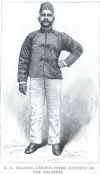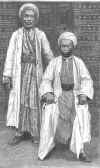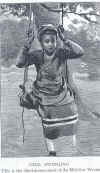|
|
the-south-asian.com DECEMBER 2002 |
||||
|
DECEMBER 2002 Contents
Real Issues Biological
Weapons
Culture Cultural
Misperceptions
Neighbours
Maldive
Islands - in 1884
Lifestyle Around us
Technology Events South Asian
Events in Lehngas - a limited collection Books
|
|
|
|||
| print gallery | |||||
|
Page 2 of 2 The Maldive Islands Part II (cntd.) By C. W. Rosset
The Maldivians are very quiet and reserved in their intercourse with foreigners until their confidence has been gained, when they show themselves hospitable to a degree. They have few wants and in, and as they possess the means of easily satisfying them, are inclined to be indolent; sober, honest, and the cheerful, they compare favourably with the inhabitants of many other Eastern countries. They are very ingenious and expert in their manufactures, and display great aptitude in the imitation of any European articles they may come across, such as knife handles, scales, and other small articles of daily use amongst us. The Sultan is a young man of some 23 years of age, strongly built, and with a well-proportioned figure. His complexion is fair, and his regular features are well set off by a jet black beard, worn short, as is the custom among Maldivians high castes. He is of a very full habit of body, and the life he leads is such as to preclude any possibility of his life being a long one. His rule is absolute; and although he has ministers whose advice he seeks on any occasion of importance, he seldom if ever profits by their wisdom, and often takes the course directly opposite to their views. He is very adverse to any intercourse with foreigners, especially Europeans, whom he either refuses to see at all or keeps waiting, perhaps, for weeks before granting an interview. At the time of my visit this cautiousness had been very much increased by the recent arrival of news from Zanzibar, giving details of the doings of the Germans in that part, and he consequently fancied that my visit had some ulterior and political design which he could only frustrate by detaining me in Male until the Ceylon arrived to take me away again. Fortunately for me, his ministers were not so prejudiced as their master, and gladly gave me all the assistance they dared in face of the restrictions put upon them by the Sultan. It is fortunate for this monarch that he has had to deal with the English for the last century, also that his dominions are a little out of the direct march of civilisation. But the time cannot be far off when his only choice will lie between submission to the Europeans or practical effacement. Although not so strict as formerly, caste distinctions are rigidly adhered to. The Sultan naturally occupies the highest rank, after him come his near relations, who have the sole right of assuming the title of Mannipul or Manifulloo; the next in rank are the descendants of former Sultans, who have a right to assume the name and rank of Didi, or Deedee. When the Sultan appoints a minister, or wishes to show any particular favour, he bestows a title, which has generally attached to it the ownership of certain islands, which become either the life property of the favoured person, or else are held by him during the Sultanís pleasure. The present ministers, with their titles and in order of rank, are: Manifulloo, title Fatina Kilage-fanu, Treasurer: he is a near relative of the Sultan, to whom he is next in rank; but he has very little influence over the monarch, hardly more than other high castes.
The trade of the Maldives must all pass through in Male and is mostly carried on indolent on the principle of barter. The bazaar in Male is the only one which exists in the group, and it is here that all the foreign trade is carried on. The shops are the personal property of the Sultan, who lets them out to a number of Bombay merchants, at rents varying from 15 rupees to 50 rupees per month. These Bombay merchants mostly sell rice and cotton goods to the natives, taking in exchange tortoise-shell, coconuts, cowries, and dried fish.
The Maldivians do not marry very early; I believe the usual age for men is between 18 and 20. Polygamy is allowed, according to the Mohammedan law, the number of a wives being limited to 4. The ceremony is extremely simple: the man having satisfied the parents of his intended bride of his ability to support her, the pair attend before the magistrate of their island, and signify their mutual wish to be joined in matrimony. The magistrate thereupon declares them to be man and wife, calling upon those assembled to be witnesses. It will readily be understood that a bond so lightly tied can be as easily severed; should a couple not agree, they attend again before the magistrate, who, after satisfying himself that both parties desire the separation, declares the marriage annulled. The amusements are very few; indeed the islanders are of two indolent and taciturn a disposition to enter with spirit into any pastime. Fishing is their favourite exercise, and is indulged in to nearly the same degree as hunting and shooting in England. They are fond of kite-flying; but this pastime is only permitted at certain periods of the year.
Crime is very rare on the islands, and the punishment inflicted would generally be considered mild in Europe. Death is never inflicted, the severest penalty being banishment to an uninhabited island for a period commensurate with the offence committed. The commonest punishment is castigation, the blows being dealt on the back and thighs with a sheet of leather inserted into a handle; but I was informed that when the punishment is intended to be very severe iron nails are inserted in the leather, which cruelly lacerate the flesh; this must be of very rare occurrence, however. I was unable to go further than the island of Male on this visit, as the Sultan (who suspected I had some ulterior political design in visiting his country) refused to allow me to proceed further. When he ultimately gave his consent it was too late, as the Ceylon was then due to take me back to Colombo, and as I had arranged to exhibit my collection at the Colonial and Indian exhibition, further delay was impossible. I intend, however, to revisit the Maldives before the close of the year, to complete the explorations begun in Male.
________The End________ (Copies of these prints are available from the-south-asian shop)
|
|||||
| Copyright © 2002 [the-south-asian.com]. Intellectual Property. All rights reserved. | |||||
| Home | |||||


